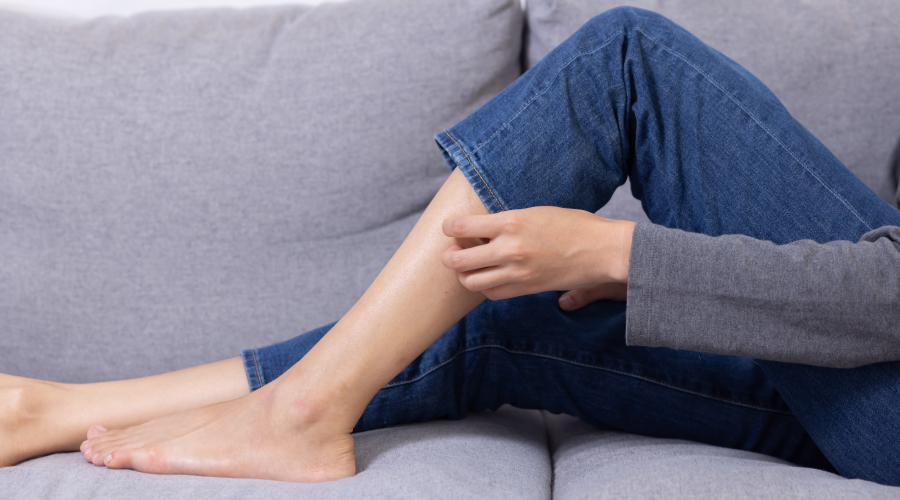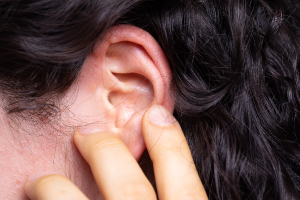

Pruritus, another name for itchy legs, is a common skin irritation which arises mainly due to dry skin. However, it can also be the result of an allergic reaction as well. Either way, skin conditions like this are usually harmless and do not require any comprehensive medical treatment. Having said that, it is not ideal to overlook such issues as well.
It is imperative to know the common causes behind itchy legs in order to go for the right remedies to combat and recover from this condition.
Reasons for Itchy Legs
There may be different itchy legs causes, so let’s understand some of the primary ones:
1. Dry Skin
Dry skin is one of the most frequent causes of itchy legs and lack of moisture is the main reason behind that. Usually, dehydration, cold, or dry weather can lead to a lack of moisture in the skin; hence, such problems come up.
2. Skin Allergens
Itchy rashes on legs that hurt might be an indication of skin allergies. An allergic response can be caused by various allergens, ranging from specific textiles and laundry detergents to insects and medicines. Moreover, they can manifest as redness, swelling, and, of course, itching. The key to controlling the itch is recognising and staying away from specific triggers.
3. Insect Bites
An insect bite is another major reason for itchy legs. Mosquitoes and other insects, when they bite, inject saliva into your skin, leading to such skin irritations.
4. Eczema and Psoriasis
Eczema and psoriasis can also lead to itchy rashes on the skin. The discomfort associated with these chronic disorders results due to the reaction of the immune system. In these situations, getting medical help is essential for a correct diagnosis and course of treatment.
5. Underlying Health Issues
Itchy legs can sometimes be a symptom of a serious medical condition like diabetes or thyroid. These conditions impact blood circulation and skin health, which leads to itch. Seeking medical attention is necessary if your itching is severe or if other worrisome symptoms accompany it.
| Did You Know? Shaving and sensitivity to certain chemicals can also lead to itchy legs. But this is not a major cause of concern as it will go away with time. |
The Night-Time Battle: Itchy Lower Legs at Night
Many people experience more discomfort when the lights go out. In this section, we will discuss the factors that cause itchy lower legs at night:
1. Dry Air in Bedrooms
Itchy legs at night can be a result of a lack of moisture in the air. The indoor heating systems remove moisture from the air during cold nights, which leads to dry skin. Use a humidifier to maintain ideal humidity and alleviate itchy legs.
2. Bedding and Fabric Irritants
Itchy lower legs at night can also be a result of materials used in sleepwear and mattresses. Choose hypoallergenic, breathable fabrics and make sure the detergent you use to wash your sheets and pyjamas is mild and fragrance-free.
3. Poor Blood Circulation
Poor blood circulation in the legs during the night is another reason for itchy lower legs at night. People with vein disorders like varicose veins can suffer, particularly at night, as sleep slows down the circulation, which causes the legs to retain fluid. Regular workouts and elevating your legs during nighttime can help you to reduce itch.
Combatting the Itch: Practical Remedies
Here are some remedies that you can follow to combat itchy rashes on legs:
- Hydration is Key: Drink enough water to prevent dry skin. Water consumption is key for moisturising your skin from the inside out, which lessens the likelihood of itching.
- Gentle Skincare Routine: Adopt a gentle skincare routine by using moderate, fragrance-free skincare products. Moreover, moisturise your body regularly, as moisturising helps seal moisture and prevent dry skin.
- Identify and Avoid Allergens: If you feel itching due to allergens, then try to find the possible triggers and switch to hypoallergenic things. Moreover, consult an allergist for thorough evaluation and treatment.
- Over-the-Counter Relief: Mild itching may be momentarily relieved with over-the-counter lotions, including hydrocortisone. But for individualised guidance, seek the assistance of a healthcare provider if symptoms continue.
| Expert’s Tip You can use coconut oil in winter to avoid suffering from itchy legs. |
Conclusion
Our everyday lives and restful sleep might be disturbed by itchy legs but the first step to treatment is realising the underlying reasons. There are several strategies for treating and relieving itching legs, ranging from drinking enough water to recognising potential allergies and using a mild skincare regimen.
If the itching is severe or accompanied by other symptoms that require attention for a thorough evaluation and individualised treatment plan, consider visiting a medical expert.
| Content Health Data | |
| Copyscape Premium Verification | 100% Passed |




